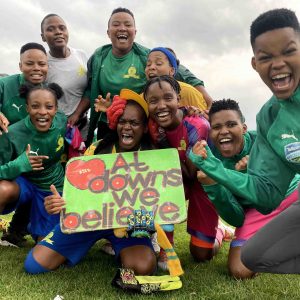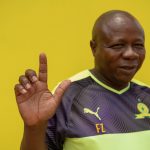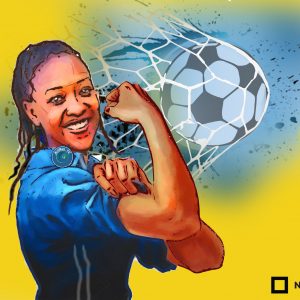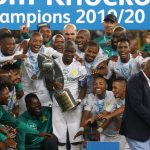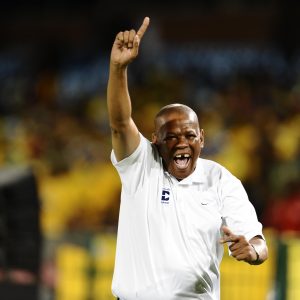The three pillars of Mamelodi Sundowns’ success
Sundowns’ assistant coach Manqoba Mngqithi and captain Hlompho Kekana explain what’s behind the club’s resilience and why they never doubted that they would win the league.
Author:
16 September 2020
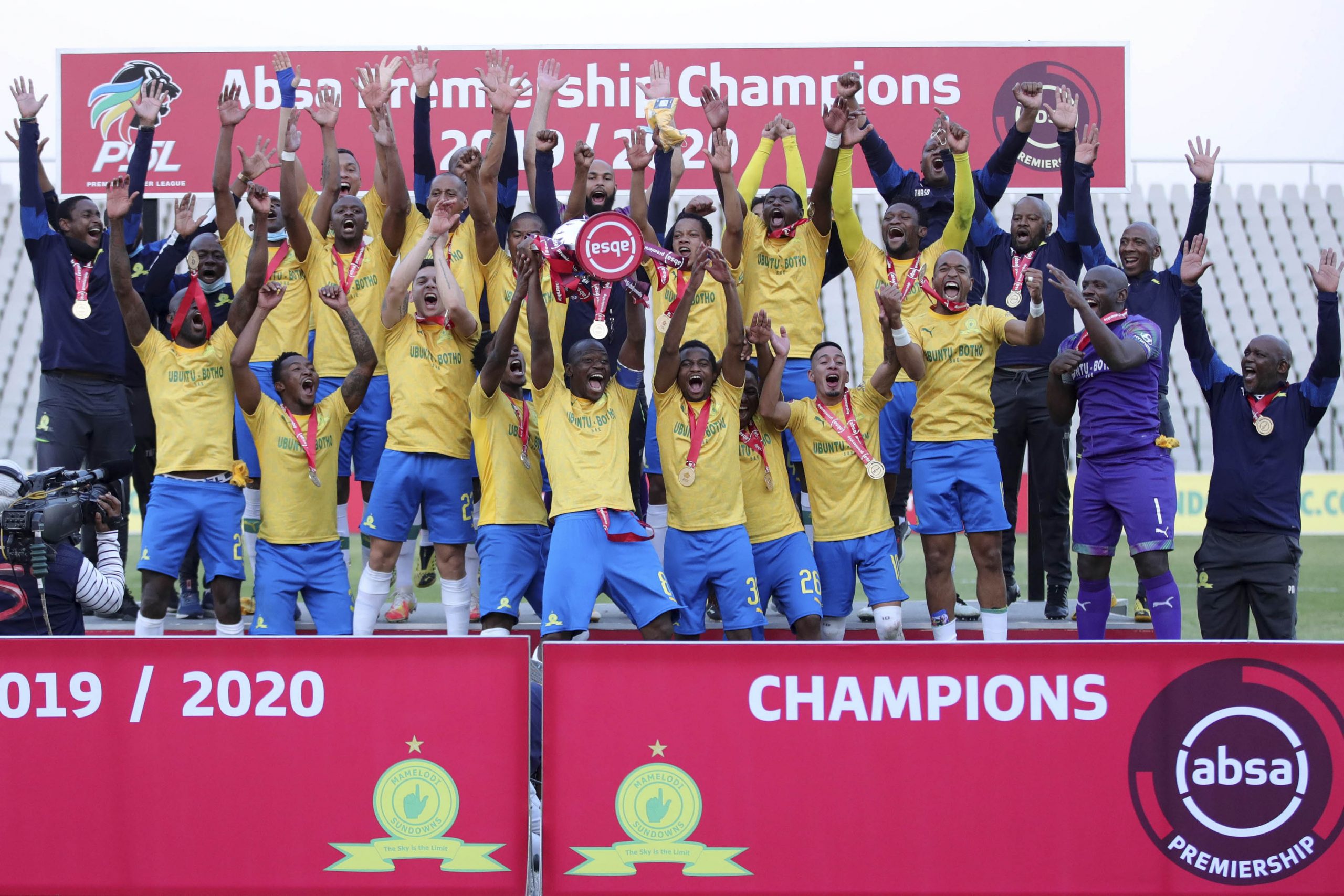
Dolisie. Sekondi-Takoradi. Setif. These aren’t just cities for Mamelodi Sundowns, these are important steps the club took to forge their most important arsenals – their character, resilience and mental strength. Without these cities, and the three pillars of success they came with, Sundowns wouldn’t have stretched their league haul to a record 10 titles in the 24-year-old Premier Soccer League era.
The 2016 CAF Champions League trophy that Sundowns lifted in Egypt on 23 October is the least impressive thing they returned with from the numerous African sojourns they have embarked on consistently since 2015. The most impressive bounty from those trips is one you can’t quantify or see with the naked eye. It’s their resilience, character and mental strength. And thanks to those qualities, they managed to cut Kaizer Chiefs’ 13-point lead to win the Absa Premiership on the last day of the Covid-19 disturbed 2019/20 season.
“To be honest with you, I never really lost hope and the team never really lost hope about winning the league,” says Sundowns assistant coach Manqoba Mngqithi with his calm demeanour.
Related article:
“There were moments where we felt down. One of those moments was when we lost to Cape Town City. We felt a bit down because it was going to be an opportunity for us to move into a good position. And again, when we couldn’t win or get a draw against Baroka. We were disappointed because we are a team that doesn’t like to lose, be it a friendly match, league match or cup match. Losing is never part of our plans. That’s how competitive we are as a team in general. There were those disappointments but the belief stayed strong.”
The league looked destined to go to Naturena due to Chiefs’ storming display in the first half of the season in a bid to end five years of drought. While Chiefs were cruising, Sundowns were huffing and puffing trying to catch up. The Brazilians’ cause wasn’t helped by their hectic schedule, with Champions League commitments and a run that saw them lift the Telkom Knockout and reach the final of the Nedbank Cup (which they eventually won on 12 September).
The confidence and good form of Amakhosi fooled some into thinking they were now assured of the league. Many loyalists even argued that they should be given the trophy when football was suspended in March due to Covid-19, because no one would catch them. Chiefs were at the summit of the league standings then, a position they sat on for more than a year before Sundowns toppled them in the last minutes of the 2019/20 season.
Related article:
“When you look at the KPIs [key performance indicators] of Kaizer Chiefs, they’ve always told us that they are overachieving when they were winning matches week in and week out, and in the eyes of the public things are looking like they are really on top of their game,” Mngqithi says. “But when you really look deeper into detail on what they are achieving, how they are achieving it, and looking at all these performance indicators, they were always suggestive that they are overachieving and maybe at a certain point this might come into an end.
“Just before we went into the bubble, they were showing signs that they might not take it. But then maybe the experiences of the Champions League also helped us. When we came into the bubble we had this belief that not many teams are used to playing two or three matches in one week. We believed that when we got into sixth gear, we might be untouchable. Chiefs in particular were playing every weekend, hardly in midweek because they weren’t part of the MTN8 and they bombed out early in the Nedbank Cup and Telkom Knockout. Based on that, they never really had these bunch of matches back-to-back like us. We knew at one point that’ll give.”

Dolisie: resilience
The seeds that gave birth to Sundowns’ dominance in South Africa were planted in Congo-Brazzaville in 2016. They weren’t even planted on a football pitch, which is fitting because Stade Denis Sassou Nguesso was a cabbage patch at the time. The football was the least challenging exercise of that trip.
The challenge was off the pitch. Sundowns drove for six hours from Congo’s capital Pointe Noire to Dolisie. They fueled up on biscuits and soda on that trip as there was a mix-up on their supply of proper food. They then spent two days stuck in Congo after the 1-1 draw with AC Leopards. Flights were suspended due to the general elections that were going on in the country.
“It’s not talent that plays in the Champions League. It’s heart,” says seven-time league winner and Sundowns captain, Hlompho Kekana. “It’s more mental than anything. When you are mentally strong, you stand a good chance of winning those matches. Playing in the Champions League tests you as a person, it tests your character. There’s a lot of things that we have to do before the match. We travel so many hours. You have to wait in transit for a long time. We have waited for 12 hours at the airport for the next flight. Because we can overcome that, so when we come home to situations that some people say are difficult, your mind says it’s easy because you have seen the worst. There’s a lot of sacrifices that the players and the technical team sacrifice to ensure that the team plays in the Champions League regularly.”
Related article:
The Brazilians will return to the Champions League next year for the seventh year in a row. No South African team has done that. Battling with the continent’s giants has sharpened Sundowns to a point that even when they aren’t at their best they can still claim to be the best in the country.
The Sundowns team that won the league this month, and the one that won it last season, were the worst performing sides since coach Pitso Mosimane took over in 2012. Despite that, they still managed to win the league through their resilience, character and mental strength. Last season they pipped Orlando Pirates who had one hand on the title already. This season they performed a smash and grab of the highest order, snatching the title from Amakhosi who were just short of engraving their name on the trophy. The Brazilians’ resilience is what makes Mosimane speak with confidence that his team can win their last five games, going as far as to dare his opponents to try and match them.
Sekondi-Takoradi: character
Sundowns landed in Ghana in May of 2016 with their chests out, ready to dispatch Medeama. They left with their tails between their legs after they were embarrassed by the side. Sundowns squandered a 3-1 lead from the first leg of the CAF Confederation Cup play-offs after they were eliminated in the Champions League. Medeama won the second leg 2-0, outclassing the Brazilians who lost their heads and started arguing with the officials and even the man responsible for the ball boys when things weren’t going their way.
Their embarrassing display on the pitch and on the sidelines didn’t matter as they were reinstated in the group stage of the Champions League due to AS Vita fielding an ineligible player. But that trip played a huge role in building Sundowns’ character and learning how to manage their emotions and games when they have the upper hand.
That character came in handy this season, so did Kekana’s character with the skipper heavily criticised and told he was past his sell-by-date when football returned in August in the biologically safe environment in Gauteng. “We are entertainers, what we do gives people something to talk about,” Kekana says.
Related article:
“I didn’t take what was being said about me to heart because I know what I can offer. People will always talk, what matters is not what you say but how you respond on the field. I know what football means to me. It’s my everything. So I will never take anything for granted, and I would never step on the field and not give my all. When I was young, I went to Jan Smuts airport to see Orlando Pirates when they came back after winning the Champions League. That’s how dedicated I am about this game. Not many people know that story.
“Football gave me everything. I went there to meet those guys, and they inspired me to be where I am today. I still have a lot to give. Criticism is part of the game. People talked when we won the Champions League. Imagine! Remember the stories about the back door? After we had won the Champions League in Egypt, and faced some of the toughest teams in Africa. So who am I for people not to talk about me?”
The club’s continental ambitions, as well as the deep pockets of owner and billionaire Patrice Motsepe, are key ingredients to their dominance in SA football.
Related article:
“The biggest advantage that we have is that amongst us as the coaching staff, and to a certain extent the president of the club, and the players that we have, we are competing against ourselves. When people are unhappy with us, and they have a feeling that we are not performing well, we are also very critical to ourselves,” Mngqithi says.
“Coach Pitso gets mad at the players for not winning a friendly match, I and the captain would also be mad at the team. So whatever people are saying on the outside [that we aren’t performing], we are saying tougher things to each other. When the results weren’t coming in the bubble, the amount of work that the technical team was putting in was immense, sitting long hours and sleeping in the early hours of the next morning trying to diagnose our situation and find solutions to improve the team. For us a loss in a match is unacceptable. A draw is unacceptable. At times, even a win that was scrappy is unacceptable.
“We would win a match and everybody else is so proud of the team but amongst us as the coaching staff and the players, when we look at the match and the mistakes we made, there would be so much unhappiness because we are very critical to ourselves. That is the biggest drive that helps us to pull through in all these challenges. We are too critical of ourselves because we want the best and the benchmark is Africa. The league and domestic competitions must prepare us for the Champions League, and whenever we are not happy with our performances locally we know that it might have an impact on our performances internationally.”
Setif: mental strength
Sundowns quickly shook off their disastrous trip to Ghana and Champions League elimination disappointment by sending a strong message when they were reinstated in the continent’s premier inter-club competition. The Brazilians stunned ES Setif on 18 June 2016, outplaying and outclassing them in their own backyard in Algeria. The club’s supporters stopped the match for almost 10 minutes, throwing bottles and other projectiles on the field.
Kekana and company took all of that on the chin, putting on a brave face in front of intimidation that would have unsettled many. What they endured in Setif makes any challenge they face in the country look small, like trying to catch Amakhosi who were running away with their league.
Related article:
“I have never doubted that we would defend our title,” Kekana says. “I even had a bet with my nephew who is a Chiefs fan. At some point they were leading with 13 points, and when I called him after we won the league he was very disappointed. I had a strong belief in my team because I know that we don’t give up. We are ambitious and we don’t give up even in difficult situations. Even when people start doubting us, we know that we will prosper.
“The one thing I told my nephew is that we will never give up because we saw what it took us to win the Champions League. There was a point where we were written off. In Setif we had things thrown at us, including bottles. When that happens, and I am not even 100km away from Zebediela where I come from, it challenges you. Once you overcome that, any domestic threat or pressure is nothing compared to what you have faced. I never stopped believing, encouraging the boys and going for a win in every match we went to.”
The challenges and the future
The biggest threat to Sundowns’ dominance is the club itself. While they are a mean machine on the pitch, in the boardroom their conduct is amateurish at times. The club’s blunder to select Tebogo Langerman in the matchday squad for the Nedbank Cup final despite his suspension, and almost bringing him into the field, is part of a longlist of administrative errors.
In 2007 Jose Torrealba challenged the club, and won, with regards to a contract extension that he claimed he didn’t sign. Handwriting experts agreed with the Venezualan. In 2014, the club accepted Alje Schut’s card from the PSL despite it showing the wrong year. A year after winning the Champions League, the club was in a heated battle with Keagan Dolly and his representatives when French clubs came after his services. At the heart of that battle was the club putting the wrong amount for the buy-out clause in Dolly’s contract.
Last season, Sundowns were found guilty for fielding an ineligible player. The club erroneously started with Wayne Arendse following Thapelo Morena’s injury during warm-up before their match against Bidvest Wits. Arendse wasn’t in the matchday squad, which meant that he should have started on the bench instead of going straight into the starting XI that had already been submitted.
Related article:
If the boardroom could match the club’s performance on the field, Sundowns the institution would be a well-oiled machine. The technical team has been bringing young blood to take over from veterans like Kekana, Denis Onyango, Anthony Laffor and Langerman when they eventually hang up their boots. Lyle Lakay, 29, is in the middle of the younger ones – who have graduated from the MultiChoice Diski Challenge team, like Keletso Makgalwa, Siphelele Mkhulise and Promise Mkhuma – and the veterans who have given the club a lot to celebrate.
“I’ve played with Denis, Hlompho and Laffor at SuperSport [United],” Lakay says. “As a youngster back then, and for the younger ones now, it’s all about learning from the senior players. Doing whatever they do to succeed. We also want to achieve what they have achieved. The main thing for us is to continue to look at them, work hard like they did and take the advice that they give. If you look at our time in the bubble, the way the youngsters performed really helped the team. It’s evident that Sundowns has a bright future with the youngsters that we have and hopefully we can continue with the success.”

